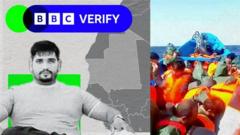BBC Verify's investigation into the Atlantic migrant crisis uncovers the chilling journey of Pakistani migrants who fell victim to a smuggler's lies, leading to death and despair in their quest for a better life in Europe.
Exposing the Tragedy of Migrant Smuggling in the Atlantic

Exposing the Tragedy of Migrant Smuggling in the Atlantic
A detailed investigation reveals the harrowing stories of migrants deceived by smugglers like Fadi Gujjar, whose promises of safe journeys turned deadly.
In January, a desperate migrant boat was rescued off the north African coast after enduring 14 agonizing days lost at sea, tragically resulting in the deaths of around 50 individuals. This disaster, perpetuated by unscrupulous traffickers, has prompted investigative efforts to unveil the identities and actions of those behind this human tragedy. BBC Verify has meticulously traced the activities of one key smuggler: Fadi Gujjar.
A recent clip surfaced on social media, revealing Gujjar's interactions with associates in a beachside café in Mauritania's capital, Nouakchott. The video showcases a convivial gathering with friends, seemingly distant from the horrific realities faced by those transported by him. Gujjar, originally from Punjab, Pakistan, had been masquerading as a guiding figure while perpetuating false hopes of safe voyages to Europe for his clients, who ultimately paid the heavy price of their trust.
Fadi Gujjar, whose real name is Khawar Hassan, operates under the radar, employing edited social media posts to promote his smuggling services while relying heavily on local networks for clients. Despite presenting a façade of legitimacy, Gujjar's operations have devastated families, particularly after two of his former customers, Sufian Ali and Atif Shahzad, met a tragic end following physical abuse while onboard the ill-fated vessel he had supplied.
Upon contacting Gujjar directly, he deflected responsibility for the events surrounding the fatal voyage, claiming that survivors had misrepresented his involvement. This coincides with a broader pattern of deceit observed in other testimonies, where victims reported being coerced into perilous situations deviating from the assurances made by Gujjar.
With routes now heavily scrutinized, Mauritania has become a focal point for migration attempts, causing distressing fatalities among hopeful migrants seeking European soil. Each endeavor, costing around $13,000 on average, exemplifies the desperation faced by those asserting their dreams for a better life.
Survivor stories depict harrowing scenes aboard the vessel: constant deprivation of food and water, physical beatings from crew members, and a frantic struggle for survival in the face of dire conditions. Amid growing despair, some managed to attract aid, leading to their eventual rescue, but not without significant loss of life—15 bodies were recovered, while many others remain unaccounted for.
Guards of the industry are now turning on one another, as authorities in Pakistan have identified Gujjar among those responsible for orchestrating this tragic journey, leading to some arrests. Yet, Gujjar himself remains elusive, further complicating a harrowing saga that shines a spotlight on the ongoing migrant crisis.
Through social media tracks, BBC Verify has noted Gujjar in various locations—most recently in Baku, Azerbaijan—raising concerns about the persistence of his operations even after such a catastrophic incident. As investigations linger on, families of victims continue to seek justice, emerging from the shadows of exploitation towards a plea for change in the treatment of vulnerable migrants across borders.




















